- News
- Reviews
- Bikes
- Components
- Bar tape & grips
- Bottom brackets
- Brake & gear cables
- Brake & STI levers
- Brake pads & spares
- Brakes
- Cassettes & freewheels
- Chains
- Chainsets & chainrings
- Derailleurs - front
- Derailleurs - rear
- Forks
- Gear levers & shifters
- Groupsets
- Handlebars & extensions
- Headsets
- Hubs
- Inner tubes
- Pedals
- Quick releases & skewers
- Saddles
- Seatposts
- Stems
- Wheels
- Tyres
- Tubeless valves
- Accessories
- Accessories - misc
- Computer mounts
- Bags
- Bar ends
- Bike bags & cases
- Bottle cages
- Bottles
- Cameras
- Car racks
- Child seats
- Computers
- Glasses
- GPS units
- Helmets
- Lights - front
- Lights - rear
- Lights - sets
- Locks
- Mirrors
- Mudguards
- Racks
- Pumps & CO2 inflators
- Puncture kits
- Reflectives
- Smart watches
- Stands and racks
- Trailers
- Clothing
- Health, fitness and nutrition
- Tools and workshop
- Miscellaneous
- Buyers Guides
- Features
- Forum
- Recommends
- Podcast
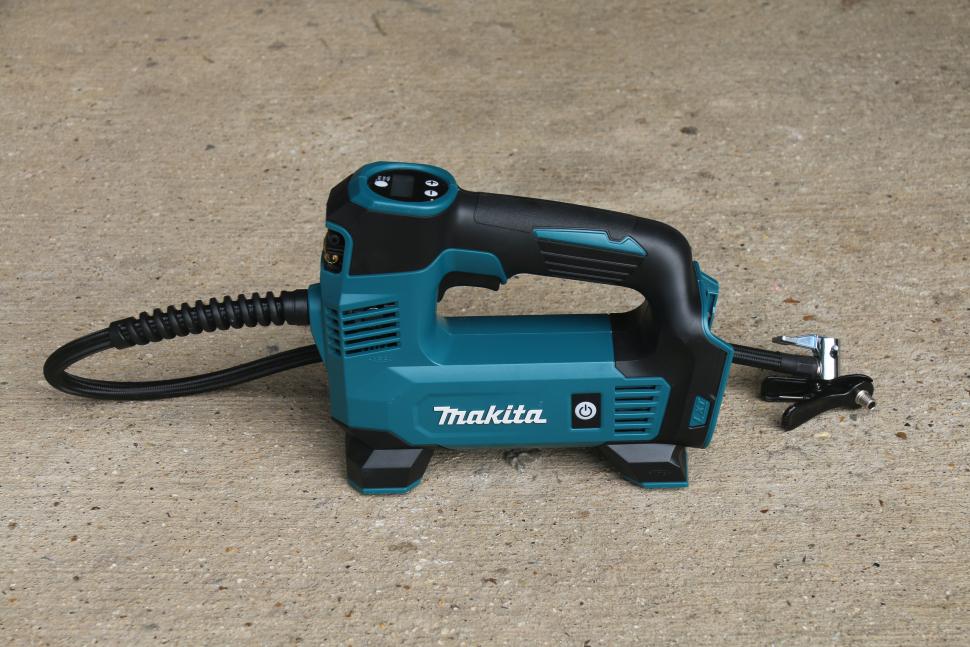 Makita DMP180Z 18V Li-ion LXT Inflator 01 - bare.JPG
Makita DMP180Z 18V Li-ion LXT Inflator 01 - bare.JPG£50.99
VERDICT:
Despite a few niggles, if you have Makita LXT power tools, you should buy one of these
Effortless and fairly fast
Battery-interchangeable with all Makita LXT tools
Expensive if you don't already have battery & charger
Noisy
Hose is short
Non-Schrader attachments feel like afterthoughts
Weight:
1,028g
Contact:
At road.cc every product is thoroughly tested for as long as it takes to get a proper insight into how well it works. Our reviewers are experienced cyclists that we trust to be objective. While we strive to ensure that opinions expressed are backed up by facts, reviews are by their nature an informed opinion, not a definitive verdict. We don't intentionally try to break anything (except locks) but we do try to look for weak points in any design. The overall score is not just an average of the other scores: it reflects both a product's function and value – with value determined by how a product compares with items of similar spec, quality, and price.
What the road.cc scores meanGood scores are more common than bad, because fortunately good products are more common than bad.
- Exceptional
- Excellent
- Very Good
- Good
- Quite good
- Average
- Not so good
- Poor
- Bad
- Appalling
The Makita DMP180Z is an easy-to-use small compressor specifically designed for tyres and other small or low-pressure inflatables. It's powered by the same interchangeable 18V lithium-ion LXT batteries used in a vast array of Makita tools – but this price doesn't include one, or a charger.
For anyone who struggles with track pumps (I have literally seen petite riders lift themselves off the floor trying to pump the last few psi into a high-pressure tyre), it makes tyre inflation incredibly easy... and the same goes if you're just feeling lazy.
This has become my go-to pump; my track pumps, even my beloved SKS Rennkompressor, are gathering dust in a corner.
> Find your nearest dealer here
My favourite feature is the ability to set the pressure on the digital display before you start. Once that pressure is reached, the compressor stops, so you can't absent-mindedly over-inflate a tyre. The maximum pressure it can reach is 120psi, which is enough for almost all bike applications except track racing.
It couldn't be simpler to use. Turn it on, set the target pressure, attach the hose to your valve, and hold the button till the pressure is reached. At that point it stops. I measured it at 34 seconds to inflate a 25mm tyre to 105psi; an SKS Rennkompressor is quicker at just 20 seconds, but is less convenient.
The hose is quite short, so you'll be sitting the inflator on the floor to use it, rather than conveniently plonking it on a bench.
Pump up the volume
It's quite noisy. Using the NIOSH's Sound Level decibel meter app on my phone I measured it at 75.8dB next to my ear, which is unpleasant, but not enough to cause hearing damage unless you run it continuously for several hours. So don't do that.
Makita recommends a duty cycle of five minutes on and five minutes off anyway (possibly the inspiration for the MP part of its name...).
The Makita DMP180Z runs off the same batteries as the company's LXT line of cordless power tools, which Makita says covers more than 270 appliances – everything from the obvious drills, saws and sanders to heated jackets, Bluetooth speakers and even a wheelbarrow. Yes, E-barrows exist. Welcome to the future.
Trickle charges
At the time of writing, the cost of entry to Makita's LXT system is about £150, which gets you a combi drill, a pair of 5Ah batteries and a charger from Screwfix. If you're already shopping for a cordless drill, then another fifty quid on an inflator doesn't look silly (who's with me?!), whereas £150 for the DMP180Z, battery and charger feels more than a little extravagant.
It's possibly a bit unreasonable to criticise a general-purpose device like this for its shortfalls as a cycling tool, but the adapters to inflate Presta valves, balls and other inflatables feel like afterthoughts. You get a screw-on brass Schrader-to-Presta adaptor, a sports ball needle and a tapered plastic widget for airbeds and like that. Perfect if you've just played a hard match of sports ball and need a lie down.
> 7 of the best mini pumps: tiny tools to get your tyres topped up
They all have a little place to live in the body of the inflator, but you just know you're going to lose them sooner or later. Assuming they last that long; the basketball needle turned out to be a piece of junk that broke at the slightest rough handling. Fortunately I was able to press it back together in a vice.
A company with the resources and general cleverness of Makita could surely source or invent a better system. I used a Prestacycle EZ-Grip Big Presta Head instead of the brass adapter, which does the job a treat.
Not out of the Woods
I do have to give credit for one aspect of the adapter collection, though. Attached to the Schrader chuck by a short chain is a sprung clamp widget for Woods valves – which Makita calls English valves, even though about the only place you see them these days is on Dutch utility bikes.
Woods valves don't have enough thread for a regular Presta head to stay attached, even though the thread size is the same, so this is very useful if you have any Dutch bikes with wacky Woods valves around.
Personally, I wish Woods valves would just go away, but it worked really well on the one Woods valve in my fleet I haven't got round to replacing.
The on is a bit off
It's a pity you have to hold the switch to make it work. When inflating larger tyres it would be nice to be able to set it going and walk away while it gets on with it. A releasable zip-tie or Velcro strap fixes that, though.
> Beginner's guide to bike tools – get all the vital gear for basic bike maintenance
I feel like I'm picking quite a lot of nits here, considering I now reach for the DMP180Z instead of a conventional track pump literally every time I have to inflate a tyre. The convenience of being able to set the pressure and have the pump get on with it is absolutely compelling; it's just ridiculously easy.
In testing I've inflated about a dozen tyres of various sizes, and a 5Ah battery is down to about half-charge.
At 1,663g with battery, the DMP180Z isn't something you'd want to carry on a ride though – or is it? I can imagine if you were a roving mechanic on a large group ride you might have a use case for it. It's small enough to fit in a pannier or large rack-top bag, so it's feasible to take it with, and boy will you look prepared when someone gets a puncture.
Overall
The bottom line is that, while there are a few irritating shortcomings that make it hard to give a top score, this is a brilliant piece of kit in terms of core functionality. If it had a longer hose, a better Presta adapter and a switch that didn't need constant pressing, it'd be perfect.
Verdict
Despite a few niggles, if you have Makita LXT power tools, you should buy one of these
road.cc test report
Make and model: Makita DMP180Z 18V cordless inflator
Size tested: NA
Tell us what the product is for and who it's aimed at. What do the manufacturers say about it? How does that compare to your own feelings about it?
It's a compact compressor for pumping up tyres and other inflatables.
Makita says:
USER BENEFITS:
Digital pressure gauge
High stability on the ground
Auto-stop function at pre-set target pressure
LED job light
In-built storage for different valve adaptors
Main switch is equipped with Auto-off function to prevent accidental start-up during transportation
Protection from over-heating: Thermostat is activated to protect the machine when the pump temperature increases
Suitable for inflating bicycle and vehicle tyres, sports balls and inflatable leisure equipment.
STANDARD ACCESSORIES:
Sport ball needle adaptor
Tapered adaptor
English valve adaptor
American valve adaptor
French valve adaptor
Tell us some more about the technical aspects of the product?
It uses the same LXT 18V batteries as over 270 other Makita appliances
TECHNICAL INFO:
Air Discharge Amount: 12 litres/min
Max Air Pressure: 830 kPa
Battery Type: Lithium-ion
Body only machine
Voltage: 18V
Noise sound pressure: 70 dB(A)
Noise K factor: 3 dB(A)
Vibration K factor: 1.5 m/sec
Vibration no load: 3.6 m/sec
Net weight: 1.4 - 1.7 kg
Rate the product for quality of construction:
8/10
Makita builds tidy stuff; this is no exception.
Rate the product for performance:
8/10
It's not as quick as a good track pump, but it's incredibly easy and convenient, especially for fatter tyres where you can just put a strap round the switch and let it get on with it.
Rate the product for durability:
9/10
Given that it's made to the same standards as Makita's other LXT tools – which are designed for fairly heavy use – I expect it'll happily cope with being banged around. It's showing no effects from being dropped on the concrete workshop floor a few times.
Rate the product for value:
8/10
If you already have Makita LXT tools, then it's about the same price as a good track pump, and that's the basis for this rating. If you don't, then you're looking at £150 for the unit with a battery and charger, and that's just silly.
Tell us how the product performed overall when used for its designed purpose
Very well, unless you're in a massive crashing hurry to inflate a tyre, in which case a track pump is a bit faster.
Tell us what you particularly liked about the product
Ease of use; in particular, being able to set a target pressure and have it stop when that pressure's reached.
Tell us what you particularly disliked about the product
The short hose and naff accessories.
How does the price compare to that of similar products in the market, including ones recently tested on road.cc?
DeWalt makes a similar device that fits their 18V XR batteries for £120 without battery or charger. That does run off a car power socket as well as a battery though, has a slightly longer hose, and inflates to 165psi. For £100 you can get a Milwaukee unit that uses the company's 12V RedLithium battery system, while Sealey offers a 20V unit for about £40, and Ryobi makes several models that work with their ONE+ 18V batteries. Those range from £36.99 to £83.99. That puts the Makita pretty much in the middle of its competition for price and features.
Did you enjoy using the product? Yes
Would you consider buying the product? Yes (I did)
Would you recommend the product to a friend? Yes
Use this box to explain your overall score
This is a weird one. The core functionality of the DMP180Z is excellent: it Just Works, and it makes inflating tyres an absolute breeze (no pun intended). It's pulled down by its collection of niggles: the short hose, the half-arsed accessories, and not being able to just press the button and let it run. While it consequently might not deserve top marks, it's still absolutely worth buying if you have Makita LXT batteries already.
About the tester
Age: 55
I usually ride: Scapin Style My best bike is:
I've been riding for: Over 20 years I ride: Most days I would class myself as: Expert
I regularly do the following types of riding: commuting, touring, club rides, general fitness riding, mtb,
John has been writing about bikes and cycling for over 30 years since discovering that people were mug enough to pay him for it rather than expecting him to do an honest day's work.
He was heavily involved in the mountain bike boom of the late 1980s as a racer, team manager and race promoter, and that led to writing for Mountain Biking UK magazine shortly after its inception. He got the gig by phoning up the editor and telling him the magazine was rubbish and he could do better. Rather than telling him to get lost, MBUK editor Tym Manley called John’s bluff and the rest is history.
Since then he has worked on MTB Pro magazine and was editor of Maximum Mountain Bike and Australian Mountain Bike magazines, before switching to the web in 2000 to work for CyclingNews.com. Along with road.cc founder Tony Farrelly, John was on the launch team for BikeRadar.com and subsequently became editor in chief of Future Publishing’s group of cycling magazines and websites, including Cycling Plus, MBUK, What Mountain Bike and Procycling.
John has also written for Cyclist magazine, edited the BikeMagic website and was founding editor of TotalWomensCycling.com before handing over to someone far more representative of the site's main audience.
He joined road.cc in 2013. He lives in Cambridge where the lack of hills is more than made up for by the headwinds.
Latest Comments
- Rendel Harris 16 min 24 sec ago
Mrs H suffers when wearing narrow shoes, just bought her a pair of Giro Berms which she loves and apparently are very comfortable (purchased thanks...
- David9694 37 min 18 sec ago
Car smashes into wall near Exeter Cathedral...
- David9694 47 min 7 sec ago
Driver Who Broke Runner's Spine in Three Places Praised for Waiting Around Until Help Arrived
- Steve K 1 hour 24 min ago
Even if this gets to 100,000 signatures, I suspect the Petitions Committee will simply say there has already been a debate, so no need for another...
- Prosper0 9 hours 15 min ago
Just doing the Lord's work in case anyone's interested in this product. This Mucoff Pump is a £100 rebrand of an £85 Rockbros rebrand of a £60...
- mdavidford 10 hours 3 min ago
Obviously it means 'springing out of the bunch' on a critical sector. Or maybe it's referring to the time of year.
- David9694 10 hours 52 min ago
Woman taken to hospital after flipping car onto roof in Trowbridge...
- A V Lowe 11 hours 34 min ago
Its blindingly obvious from the image that the DKE of the buses include the mirrors which extend to nearly reach the edge of the tarmac pavement on...
- Sredlums 12 hours 7 min ago
It's sad when being very good at your job - any job - isn't enough to earn a decent living. It shouldn't be that way....












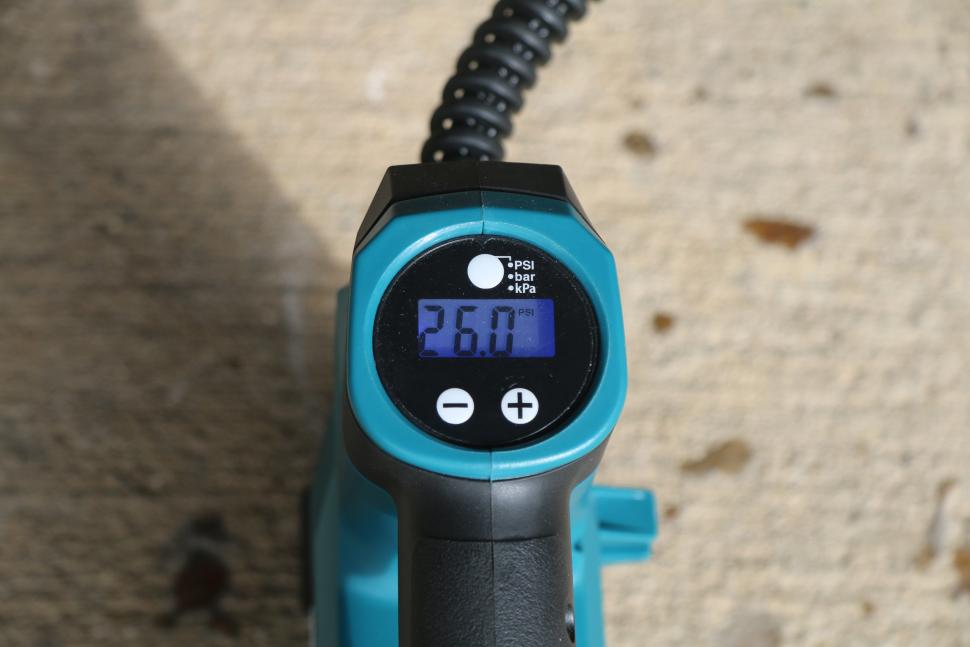
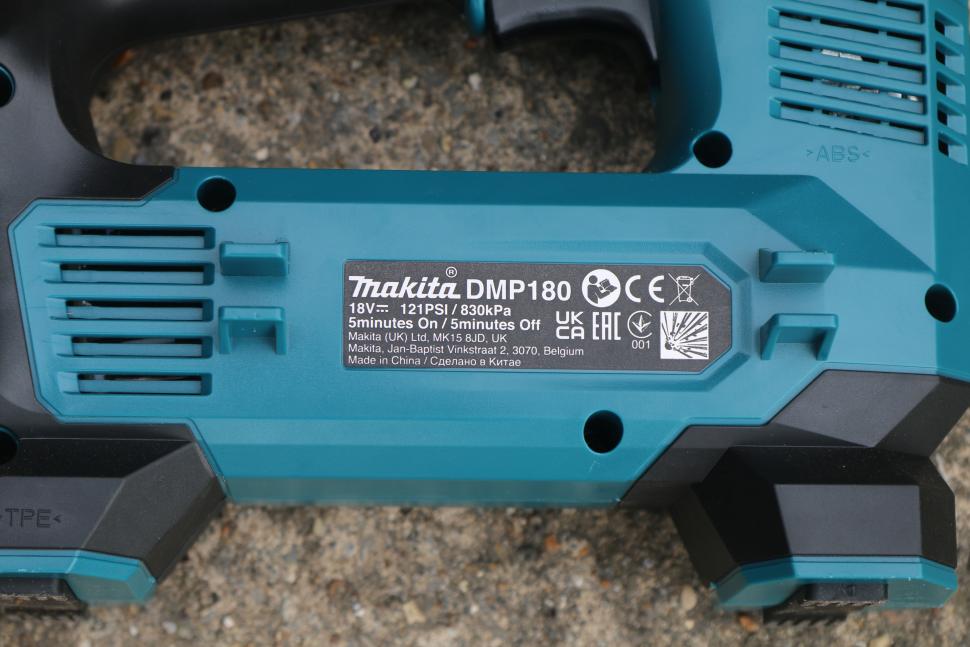
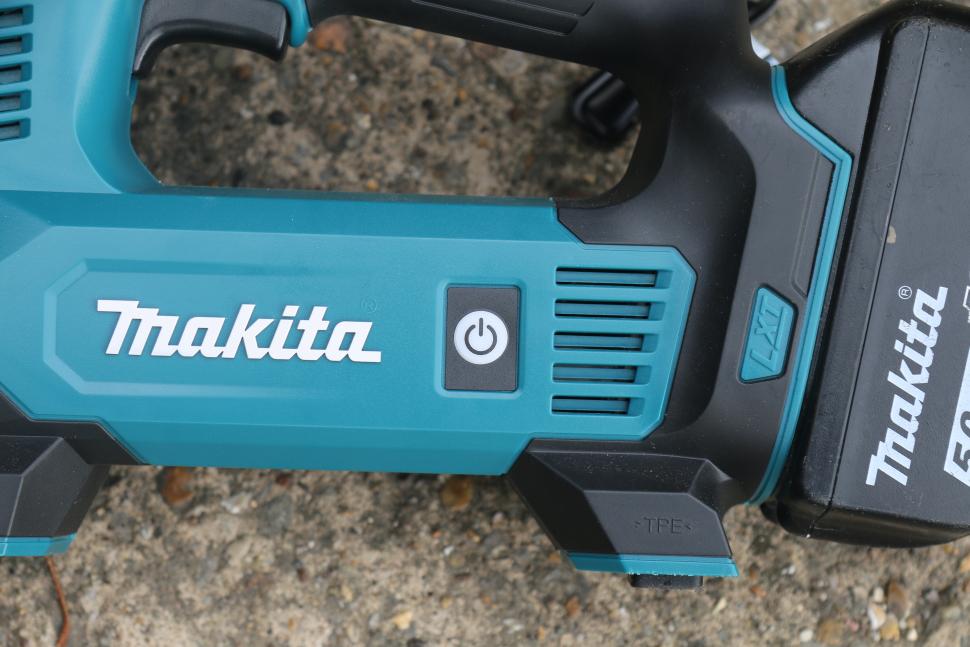
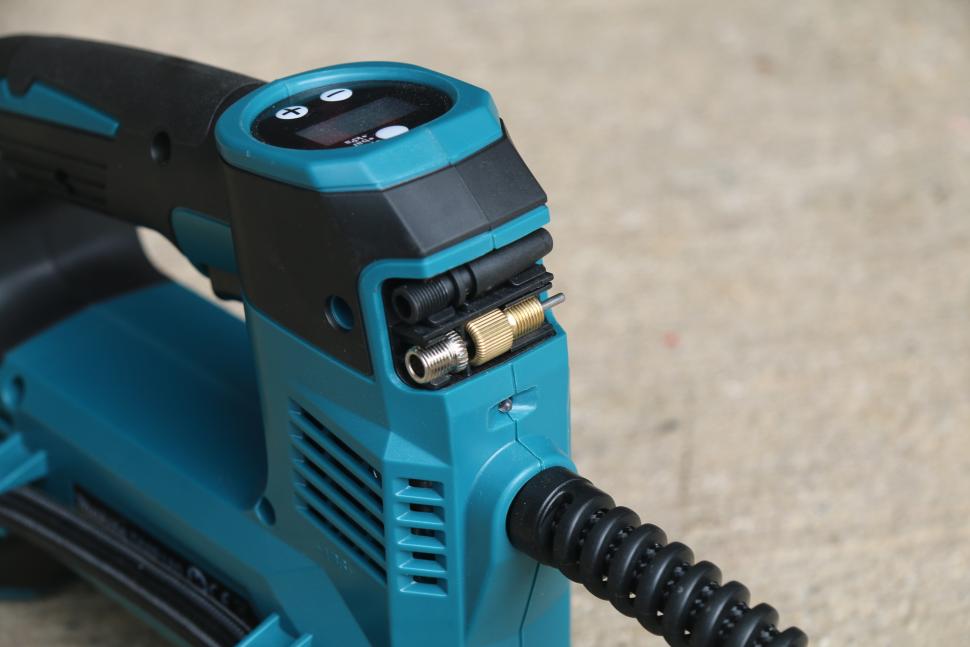


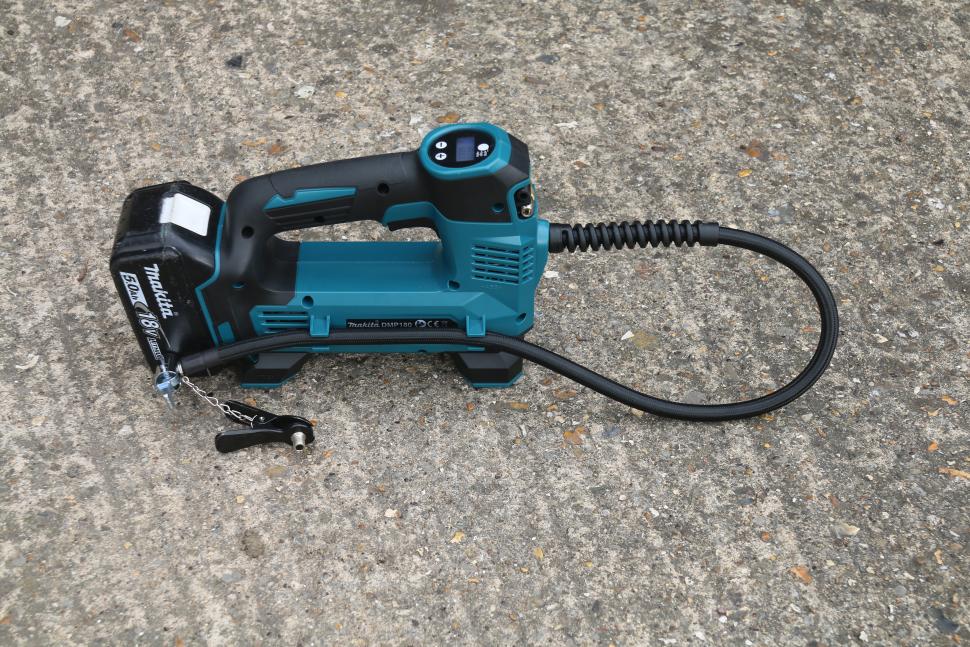

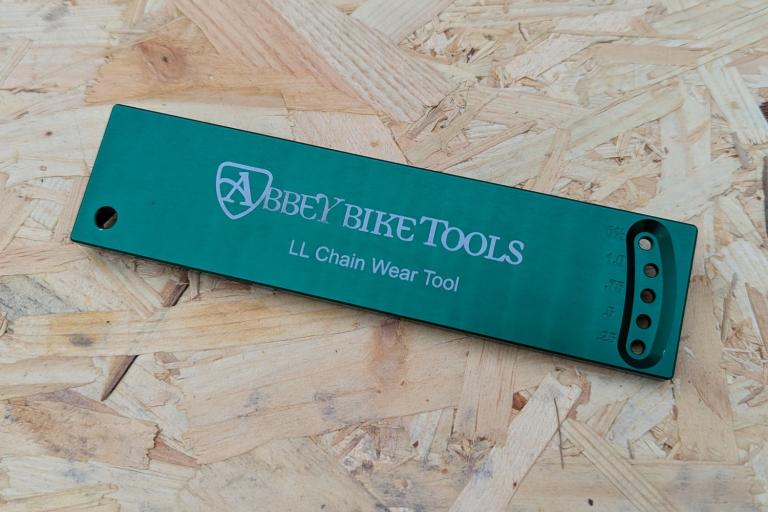

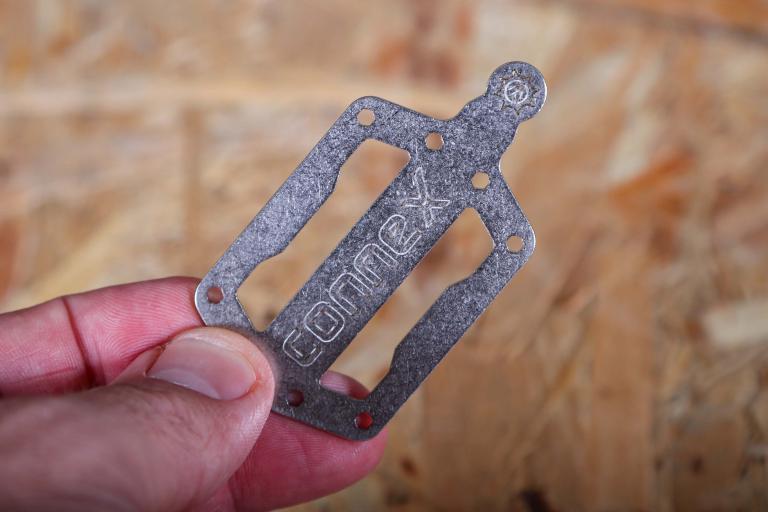
Add new comment
12 comments
Woods, or English, valves are on every kind of "regular" bike over here in Japan hence the little clip. I hate them. Annoying to inflate and with the hot summers the little rubber valve cover inside perishes relatively quickly without warning. Hopefully when you aren't riding it otherwise it dumps all the air instantly and often the rider too. Rant over, Makita tools and their batteries are ace. Especially useful after an earthquake for powering all sorts of things when the electricity and water gave been cut.
Bought one of these a while ago pretty happy with it and use it pretty much for every ride. The Schrader attachment is certainly an after thought but works well. Lost mine but picked up some replacements on eBay for £3. The guage is pretty accurate and matches my Topeak digital guage. Really only make sense if you already have the batteries. Certainly not the worst thing I've bought for cycling.
Ever since one of my car tyres developed a slow puncture I've been keeping an eye on the price of these on Amazon after a discussion popped up on the CTC forum:
https://forum.cyclinguk.org/viewtopic.php?p=1614831#p1614831
As a newly converted LX battery bloke I seem to be looking for excuses to buy handy 'bare' tools to use with the TWO batteries in my Makita drill's box. One charge of the first battery last summer an it's only just down to one red bar. The second battery is untouched. Recommended brand.
(In the end I had a new car tyre fitted, but Christmas is only just round the corner...)
'I have literally seen petite riders lift themselves off the floor trying to pump the last few psi into a high-pressure tyre'
Hyperbole? Or just someone overinflating their tyres?
Not hyperbole, I think. Say you assume the area of the piston of a track pump is one square inch, which must be ballpark correct, and someone wanted to put 120psi into a tyre, then if they weighed 120 lb (a petite 54kg) they would need their entire weight on the pump handle at that pressure.
And people run over 200 PSI for track cycling.
Why were they lying on the floor while pumping up their tyres in the first place?
Can it inflate a tubeless tyre from zero? This is what we need to know.
Probably no better than a good track pump - i.e. it wouldn't be very good for seating troublesome tyres. For that you want a compressor with a tank, rather than just an electric inflator.
I've been using one for months and it's a great bit of kit. I picked up the body (already had batteries) for about £45 on amazon.
It's super handy for a quick top up and pressure check in tubeless tyres.
I'm in exactly the same situation. I would say if you already have Makita LXT kit buying one of these is a no brainer - it's a fantastic bit of kit. If you have to buy the battery and the charger as well then it all depends on how much you are prepared to pay. BTW Makita cordless tools and their associated batteries and charger are amazing. I've had all sort of cordless tools over the years and wasted a lot of money. I should have paid more for Makita in the first place and saved myself money. Of course if you're into a bit of DIY why not treat yourself to a Makita cordless drill complete with battery and charger and a spare battery at the same time!
Do you know if the chuck could be replaced with a decent presta chuck? This and a SilcaHiro could be a great combo.